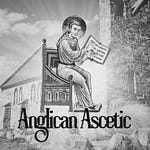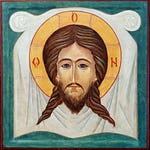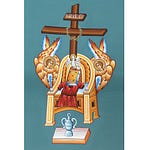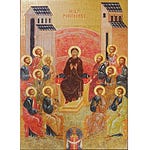Homily offered by Father Matthew C. Dallman, Obl.S.B., for the Parish of Tazewell County on the Feast of All Saints, 2019.
If the Saints were not central to the Christian faith, and if active and living communion with them not obligatory upon all Christians, then we would not, in the baptismal creed of the Church called the “Apostles’ Creed,” proclaim a belief in the Communion of the Saints. But the fact of the matter is that we do proclaim our belief in the Communion of the Saints at our baptism. And the Church professes her belief in the Communion of the Saints every morning in Matins and every evening in Evensong. Any feast day that shows up in the creeds of the Church, or can be found by thinking about the creeds, is by definition a major feast. In the creeds, for example, we can easily find Christmas, Holy Week and Easter, Ascension, Christ the King, Pentecost—and in the Apostles' Creed we find All Saints.
This should not be surprising, because it was through a communion of Saints that the Church of Jesus Christ was born. One hundred and twenty Saints were gathered in the Upper Room, told to go there by Jesus Christ to await the promise of the Father, the Coming of the Holy Ghost. This was the first Church. Gathered in the Upper Room for nine days were Blessed Mary, whom the Church quickly saw as Mother of the Church, along with other holy women, Mary Magdalene, her sister Martha, Mary the wife of Cleopas, perhaps Peter’s mother-in-law; along of course with the Eleven men singled out by Jesus for a particular task, soon joined by Matthias taking over for Judas.
It was from and through this communion of Saints, this gathering of Saints, this fellowship of Saints—all of whom were apostles because “apostle” means someone sent and each Saint in the Upper Room was sent there by Christ to wait for the Holy Ghost, and in a more general sense sent by Christ to proclaim to the nations the Truth that can only be found in Him; it was through this all-star communion of Saints: their daily prayer, their breaking of bread, and their fellowship and teaching, that the Church came to be by God’s action through them. God acts through His Saints. God reveals Himself through His Saints. God brings about that which is new through His Saints. God transforms the world through His Saints.
How does this happen? It happens because the Saints are those people who, in the words of Saint Paul, have the eyes of their hearts enlightened by God. “The eyes of their hearts enlightened”—Paul teaches—so that persons who receive such grace know what is the hope to which God has called us, according to His great might which He accomplished in Christ when He raised Him from the dead and made Him sit at His Right Hand in the heavenly places. It starts with the enlightenment of the eyes of the heart. God accomplishes His mission through those whose heart has enlightened eyes. Not eyes that do not see God in the world, but rather eyes that see God in the world through all things good, beautiful, and true. Not eyes that are impatient with the world, but eyes of patience and humility that look for Him even when He might be hard to find. Not eyes that do nothing but judge others for their sins and inadequacies, but eyes that see Jesus in the face of every person they meet. Not eyes of suspicious, but eyes of love—indeed, enlightened eyes of the heart means the eyes of Jesus, the eyes of His sacred humanity. Eyes of compassion and mercy, eyes that forgive—eyes through which grace in its fullness can be found, because such eyes of the heart is Christ in us.
Brothers and sisters, all of this is biblical Christianity, and this is why churches such as ours who seek to participate in historic, sacramental Christianity usually take a Saint as a patron of the parish—in our case, Saint Paul, and in our sister congregation, all the Saints. And, likewise, this is why God has led our Parish to see Saint Teresa of Calcutta as our patron of our Mission in Tazewell County. She is a powerful example for us of how to embody the Gospel as we encounter others in our day to day lives. “We are to be Christ to the world, and to every person we meet,” she teaches us. “The greatest disease in the West today is being unwanted, unloved, and uncared for,” she teaches us. “Help one person at a time and always start with the person nearest you,” she teaches us. That teaching is the Gospel. Through that teaching, Christ acts. Through that teaching by this Saint, God reveals Himself. Through that teaching God brings about that which is new. And through that teaching by this Saint, who in her words captures what’s fundamental about Christ’s teaching to His Church, through that teaching God transforms the world. Let us be led, brothers and sisters, by this teaching—led in our mission in Tazewell County.
Icon by the hand of Aidan Hart.










Share this post